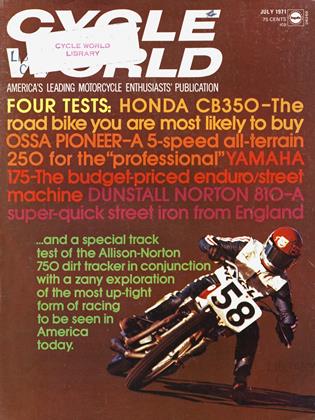THE SCENE
IVAN J. WAGAR
EFFECTIVE January 1, 1972, all AMA amateur competition, with the exception of Bonneville speed trials, and professional motocross will be conducted with motorcycles muffled and not producing over 92 db (A) at 50 ft., as measured by the established MIC standard.
This was the positive action taken by the American Motorcycle Association at an executive committee meeting in Las Vegas on April 15th. The resolution is essentially the same as the one defeated by the AMA Competition Congress last fall, and proves that the new AMA has the courage to overrule the Congress when the best interests of the future of motorcycling is threatened. Thus, after a year of pressure from a few people in our sport and industry, the groundwork is being laid that will, hopefully, reduce motorcycle noise drastically, and thereby (hopefully) reduce the amount of restrictive legislation with which we will be faced.
On the very same day that the AMA passed the resolution, the Las Vegas Sun, a leading Nevada newspaper, reported that the Nevada State Assembly had “politely killed” a restrictive land use bill. The term used to describe the action was presented by the bill’s author, John Homer, when it was bounced back to his environmental and public resources committee. The Sun brought out two important points which were considered in the Assembly’s decision, both of which have been stated in this column on several occasions.
One assemblyman made it clear that he was opposed to the bill, but warned that those off-road vehicle drivers “better do something themselves ... if they don’t clean up their own house someone else will do it.”
On this matter the AMA, which now represents about 130,000 members, has taken the first step to clean up our house. Chet Winters, who heads up the AMA’s new legislative department, now has a tool he can work with in his efforts to keep lands open.
The other part of the report, which I have been harping on for five years, is that the bill was shuffled off because of the thousands of letters and phone calls received opposing it. And that’s where you come in. When you learn of restrictive motorcycle legislation, by all means write CYCLE WORLD and the AMA, but also take the time to write your assemblyman. Your votes put him in office, and your future voting will either keep him there or put him out of politics. Please don’t ever think that your one letter will have no effect. (íet the mail in there and really make it clear that you don’t like what he is doing.
A parallel to this is the defeat of the SST. While in Washington D.C. attending a recent Advisory Council meeting, l learned of the plight of one of the senators who voted against the SST. He might have personally favored the development of the airplane, especially when it would cost more to stop the program than to go ahead and finish the two prototypes. His “no” vote, however, was due to the 40,000 letters of opposition from his constituents, the very people who had elected him to represent them in Washington. Relatively speaking, the senator received only a small percentage of mail in favor of support for the SST program, and most of those seemed to be from industry and people financially interested in the airplane’s continuance.
This man knew that if he ignored his constituents he would be out of D.C. after the next election. Any politician with a desire to stay in politics is going to be in favor of anything that the majority of the voters want. In this case the environmentalists and other very interested groups did their homework: they wrote letters. And they wrote so many letters that the politicians were left with no choice. So the next time you feel that industry should protect you, and you feel it is a waste of time to write your representative, remember the SST.
If a restrictive bill affects your city or the state in which you reside, write letters to everyone in a position to receive your vote in the next election. And make it a point to be sure that all of your friends do likewise. [Ô]
LESS SOUND MORE GROUND














